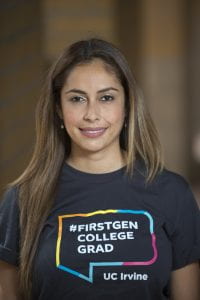
Glenda Flores
Steve Zylius / UCI
Working at a dry cleaner shop starting at age 10.
A third-grade teacher’s reprimand for solving math problems with a method taught by her Mexican immigrant mother.
Watching her construction worker father singlehandedly build his family a new house behind their old one on a “sometimes scary” Orange County street.
Talk for a spell with Glenda Flores, UCI assistant professor of Chicano/Latino studies, and various out-of-the-ordinary memories emerge from her childhood in a rough Santa Ana neighborhood.
Although some folks might leave such environments and never look back, Flores – the first in her family to finish college – decided to return to her community to give back to other youngsters. Before graduating from UCI, she had planned to work as a bilingual elementary schoolteacher in the Santa Ana Unified School District. But as controversy engulfed dual-language instruction programs and some efforts were dismantled, she switched to education research and went on to earn a Ph.D. in sociology at USC.
Her doctoral work grew out of observing white schoolteachers running classrooms full of students from blue-collar Latino families. Too often, Flores says, the teachers viewed ethnic cultures and practices as obstacles to learning, as was the case with her own third-grade math instructor.
“That childhood experience stuck with me,” she says. “And 20 years later, it’s still happening.”
Now back at UCI, Flores has continued digging into the issue. Sitting in a third-floor office decorated with portraits of artist Frida Kahlo, she recounts spending two years interviewing educators and parents in Compton and Rosemead for a new book, Latina Teachers: Creating Careers & Guiding Culture. Due out next year, it explores how Latino faculty preserve cultural identity among students, sometimes by surreptitiously “subverting workplace rules.” Her next book will focus on Latino physicians.
In addition to research and teaching, Flores mentors first-generation college students at UCI. From her own undergraduate days, working two jobs to avoid being a financial drain on her parents, she knows the difficulties of trying to juggle study time with family obligations. “For many first-generation students, college is an economic sacrifice,” she says. “Don’t be afraid to seek help, and be sure to see an academic counselor.”
